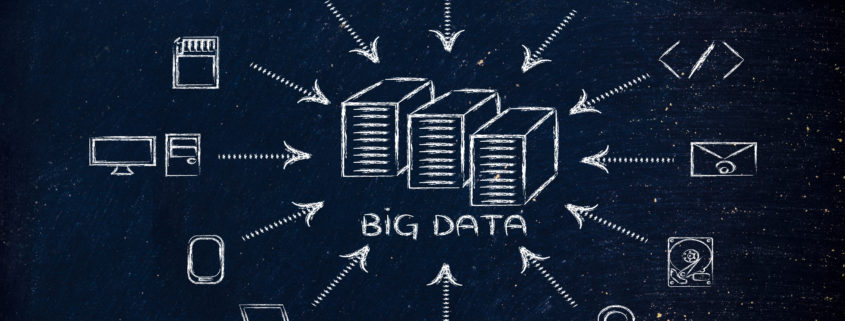The Underestimation Of Connection And Big Data

The underestimation of connection and big data.
Why Was The Importance Of Connections And Big Data Underestimated?
As a filmmaker, I respect Steven Spielberg a lot but watching his movie A.I. Artificial Intelligence from 2001, knowing about the progress in A.I. currently might be an indication about actual prognoses.
The film is actually very well done, touchy and a very important subject get addressed in a time when robots have been seen as machines, built as a mechanical copy of the human being.
Let’s go back to 2001 to understand the point of evolution then.
In 2001 the Internet was well established and I remember here in Switzerland we had first consumer ADSL at home. We had just lived through the millennium step, being a big concern of the entire IT industry. In the professional industry, UNIX was the number 1 server operating system, running on big and very expensive IBM and Sun Solaris workstations.
(I remember the company evaluating new production servers for more or less 100’000$)
Apple launched OS X, Microsoft introduced Windows XP and Linux distributions became more and more stable. Nokia profited from the hype of the first mobile generation and the world dropped into terror mode after the twin tower attack in Manhatten.
Google started to grow after being found in 1998 by Larry Page and Sergei Brin and they basically started the public data collection.
Why did Steven Spielberg and his consultants not understand the importance of connection and big data then?
Currently, AI Scientists are arguing about how long it would take to make a superhuman robot and what it would take. Watch it …
To me, it seems to be the mobile revolution, responsible for the beginning of any data collection.
In 2001 it just was no option to have the network speed for live streaming 4K video and store terabytes of data at hand!
To understand what’s happening we have to look at the steps of evolution in the different fields.
Facebook would not exist today if the world would not have been ready for it. We had to be reachable nearly instantly by the first generation of iPhones to be able to connect without dependence to the location. The camera in the iPhone had a certain quality and it became possible to document our steps. Besides, computer power and storage made it possible together with a constantly improving network speed.
I remember before the IPO of Facebook when there have been rumors about how Facebook will earn money to fulfill with the tremendous amount of funds invested in the company.
Then Ad Networks started to establish in all Social Platforms and started the golden age of social media we are in.
The point I am trying to make is: Different circumstances have to be in place to cause an important change in future history!
Google is building an incredible service currently (and some others do too)! This service is just possible because of the constant extension of data mining (data collecting) since 1998. The global connectivity through the Internet and all its users started the of upload photos, audio, and videos to share it worldwide. The computer received vision through digital cameras. Limitation of storage capacity, processor speed, and transaction speed caused a delay on the progress of the visual side, where mainly the iPhone was a driver of the process.
The incredible databases of Google search, Youtube search, geographies through Google Maps and much more have been the base of contextual and lately visual learning of computers by collecting Big Data.
Getting deeper into Artificial Intelligence we find, that this collection of Data, which is progressing more than ever, by the way, is the cause for our latest development in the field of AI. When Gerry Kasparov lost against the first computer of IBM in chess in 1995, we have still been in the field of calculating possibilities and solutions to make the computer win the game. This computer was not trained like AI systems are! The scientists at IBM won principally from a point of view, where calculation power and algorithms have been more potent than those in our human brain concerning the logical game of chess in its limited environment. The computers of that generation influenced what we see now in machine learning because scientists got to a limit of further development of this approach.
Now the game is different!
AlphaGO is part of the Deep Mind project of Google in their Artificial Intelligence division. This computer program is just the tip of an iceberg. They told AlphaGO to figure out the game GO and specialize in this field, whilst they are training many more AI algorithms in different fields.
Many services had been created to analyze the data and find solutions.
When a computer gets a picture presented, first of all, he receives a certain amount of pixels, driven by the lens of the cameras. What a computer sees is a set of pixels, with different intensities.
How should a computer be able to distinguish a cat from a dog? Well, they tell these computers some things and then they just keep learning.
(A very common situation)
Insights by Fei-Fei Li (Google and Stanford AI Lab)
It is an interesting focus Fei Fei Li makes about the importance of the eye in the evolution of living creatures and I will address this in a future article.
How does data collection progress?
As all fields of science and business progressed and changed a lot, we are collecting an immense amount of data! There is a lot of talk about processor power, but we also need high speed and capacity memory and real big hard drives to store all data we collect and produce from the collected data.
Currently, still, one big factor is the outranging energy consumption of computer plantations. I imagine this issue being solved sooner or later through optimized renewable energy.
When it was mostly text we saved online some years ago, we upload more and more video to the different providers (Youtube and Facebook). Bright machines, accessed through the Google Vision project as an example can analyze and categorize videos and visualize the appearance of the content.
If you think of a self-driving car like Tesla, every car collects video from different perspectives all the time and runs its calculations on it …
Data collection actually has some traps we have to think well about!
Centralization and Decentralisation
When I worked for a financial services company as an application developer back in the days after 2001, I remember, there were serious concerns about attacks and how to avoid the destruction of data and services, relevant to the Swiss stock exchange.
Building back up systems for the big data centers is common practice, so even if we store data at Amazon AWS, Google Cloud, iCloud or at any other Cloud solution from smaller providers, data as such is centralized but most of the time doubled or tripled in the cloud infrastructure of the service provider.
This means some form of centralization but data being decentralized behind the scenes, maybe even through different states and jurisdictions, making it even more difficult to track.
Trends are clearly directing to centralization with big players, building incredible infrastructures. It is quite difficult for a smaller provider to keep track with the big players as these offer pricings out of reach for smaller providers.
Ownership and Falsification
I think this is a big subject, we should care about!
Maybe you have seen some of Facebooks augmented reality platform.
Is that fun?? When will Mark Zuckerberg grow up and take responsibility on what looks so funny to him to create??
On first glance, it is cool, but on the second it is more of a threat to our visual experience!
But let’s give this some thoughts …
Photoshop (amongst others) and its possibility to change pictures is on one end helping us to optimize pictures and create new pictures.
On the other end of pictures, we rely deeply on our visual experience and the judgment our brain needs to learn and understand. Especially for kids, being primary consumers of this new fancy trend this might be confusing and even building schizophrenic symptoms.
It all comes down to the problem of FAKE NEWS and its identification!
FAKE NEWS can have deep impacts like wars stock market declines and much more!!
All this would not be possible without our already tremendous amount of Data and the ever-growing connectivity!
As Elon Musk from Tesla suggests AI and its primary players should be regulated sooner than later!!!
I will provide deeper thoughts about ethics in another post soon, so stay tuned …
What is your opinion? Leave a comment below and share if you like …




Leave a Reply
Want to join the discussion?Feel free to contribute!